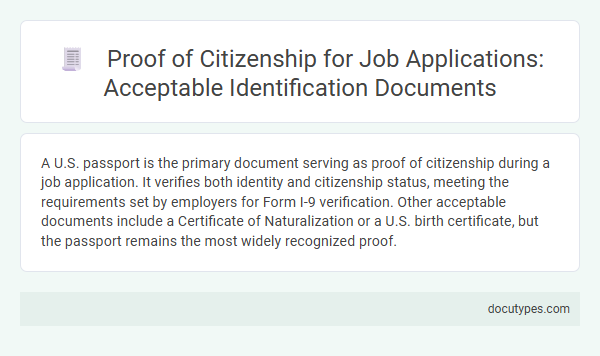A U.S. passport is the primary document serving as proof of citizenship during a job application. It verifies both identity and citizenship status, meeting the requirements set by employers for Form I-9 verification. Other acceptable documents include a Certificate of Naturalization or a U.S. birth certificate, but the passport remains the most widely recognized proof.
Understanding Proof of Citizenship for Employment
Proof of citizenship during a job application is typically established using official government-issued documents. Commonly accepted documents include a U.S. passport, a Certificate of Naturalization, or a Certificate of Citizenship. These documents confirm an individual's legal status and eligibility to work in the United States, meeting employment verification requirements.
Why Employers Require Citizenship Documentation
Which document serves as proof of citizenship during a job application? Employers require citizenship documentation to verify legal work eligibility and comply with federal immigration laws. Acceptable documents include a U.S. passport, a Certificate of Naturalization, or a birth certificate accompanied by a government-issued photo ID.
Commonly Accepted Proof of Citizenship Documents
Proof of citizenship is a critical requirement during job applications to verify a candidate's legal status. Commonly accepted documents serve as reliable evidence for this purpose.
Among the most widely recognized documents is the U.S. passport, which unequivocally confirms citizenship. Other frequently accepted proofs include a Certificate of Naturalization and a U.S. birth certificate.
U.S. Passports as Citizenship Proof
| Document Type | Role in Job Application | Details |
|---|---|---|
| U.S. Passport | Proof of Citizenship | A U.S. passport is an official government-issued document that verifies an individual's U.S. citizenship for employment eligibility. It serves as a reliable form of identification during job applications and satisfies the requirements of the Form I-9 verification process. |
| Driver's License or State ID | Identification | These documents prove identity but do not establish citizenship status. They are often used alongside citizenship proof like a U.S. passport. |
| Birth Certificate | Proof of Citizenship | State-issued birth certificates demonstrate U.S. citizenship but usually must be presented with photo identification. |
Birth Certificates: Valid Formats and Requirements
Birth certificates are the most common proof of citizenship required during job applications. Your birth certificate must meet specific format and requirement standards to be considered valid.
- Official State-Issued Format - Birth certificates must be issued by a U.S. state, territory, or the District of Columbia to serve as valid proof of citizenship.
- Certified Copy Requirement - Only certified copies displaying an official seal or signature are accepted; photocopies or hospital records do not qualify.
- Essential Information Included - The document must include the individual's full name, date of birth, place of birth, and parent(s) names to verify citizenship accurately.
Certificates of Naturalization and Citizenship
Certificates of Naturalization and Citizenship serve as primary proof of citizenship during job applications in the United States. These documents verify an individual's legal status and eligibility to work.
Employers often require these certificates to confirm United States citizenship as part of the Form I-9 employment eligibility verification process. Possessing a Certificate of Naturalization or Citizenship simplifies establishing lawful employment status.
Permanent Resident and Employment Authorization Cards
When applying for a job, proof of citizenship or authorization to work is required to complete the employment eligibility verification. Permanent Resident Cards and Employment Authorization Documents serve as key identification for individuals who are not citizens but are legally allowed to work in the United States.
- Permanent Resident Card (Green Card) - This card proves lawful permanent resident status and authorizes the holder to work in the U.S. indefinitely.
- Employment Authorization Document (EAD) - This document grants temporary permission to work for individuals who are authorized but do not have permanent resident status.
- Use in Job Application - Employers accept these cards as valid proof of eligibility to work when verifying Form I-9 compliance.
Both cards are essential for non-citizen employees to demonstrate their legal right to work during job application processes.
Difference Between Citizenship and Work Authorization Documents
During a job application, a U.S. passport or a Certificate of Citizenship serves as primary proof of citizenship. These documents confirm an individual's status as a U.S. citizen, which is distinct from work authorization status. Work authorization documents, such as an Employment Authorization Document (EAD), allow employment but do not prove citizenship.
Tips for Safeguarding and Submitting Sensitive Documents
Proof of citizenship during a job application typically requires a government-issued document such as a birth certificate, passport, or naturalization certificate. Safe handling and secure submission of these documents are essential to protect against identity theft and unauthorized access.
- Use Certified Copies - Submit certified copies instead of original documents to minimize the risk of loss or damage to sensitive records.
- Encrypt Digital Files - When uploading citizenship documents online, encrypt files and use secure portals provided by employers to maintain confidentiality.
- Limit Sharing - Share citizenship documents only with authorized personnel and verify recipient legitimacy to prevent misuse of your personal information.
Which Document Serves as Proof of Citizenship During Job Application? Infographic

